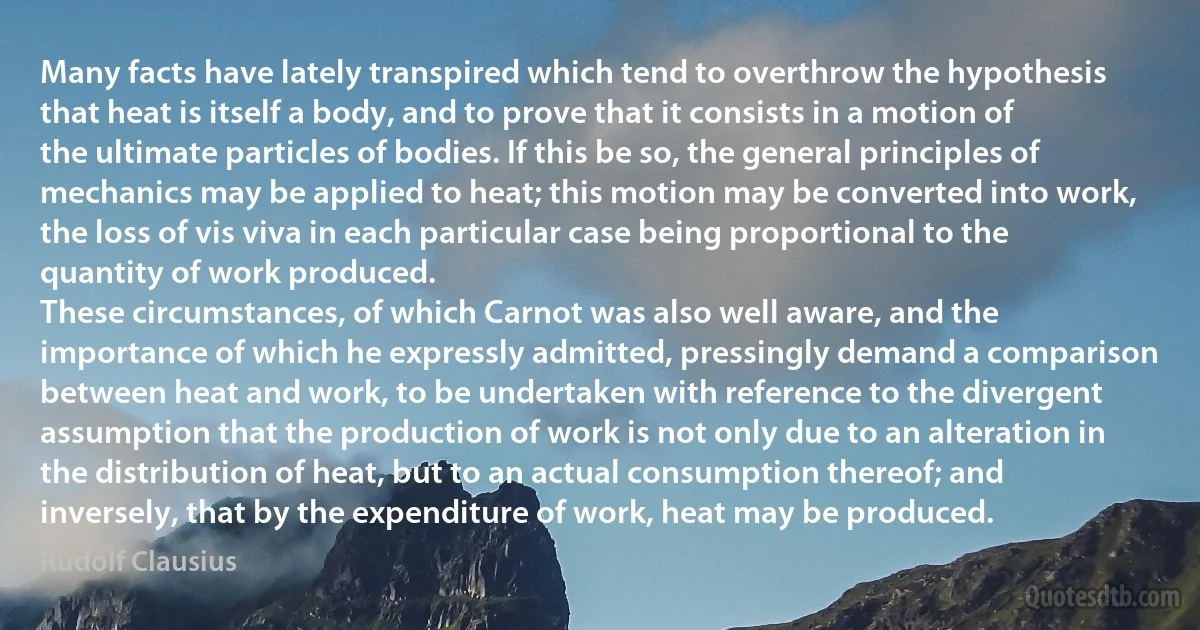
Many facts have lately transpired which tend to overthrow the hypothesis that heat is itself a body, and to prove that it consists in a motion of the ultimate particles of bodies. If this be so, the general principles of mechanics may be applied to heat; this motion may be converted into work, the loss of vis viva in each particular case being proportional to the quantity of work produced. These circumstances, of which Carnot was also well aware, and the importance of which he expressly admitted, pressingly demand a comparison between heat and work, to be undertaken with reference to the divergent assumption that the production of work is not only due to an alteration in the distribution of heat, but to an actual consumption thereof; and inversely, that by the expenditure of work, heat may be produced.
Rudolf ClausiusRelated topics
alteration assumption body case consumption distribution due general heat hypothesis loss mechanics production proportional prove ultimate well work circumstances factsRelated quotes
Labor is a commodity, like any other, and its price is therefore determined by exactly the same laws that apply to other commodities. In a regime of big industry or of free competition – as we shall see, the two come to the same thing – the price of a commodity is, on the average, always equal to its cost of production. Hence, the price of labor is also equal to the cost of production of labor. But, the costs of production of labor consist of precisely the quantity of means of subsistence necessary to enable the worker to continue working, and to prevent the working class from dying out. The worker will therefore get no more for his labor than is necessary for this purpose; the price of labor, or the wage, will, in other words, be the lowest, the minimum, required for the maintenance of life.

Friedrich Engels
It is a fundamental and deplorable error by which we in this country have confused education with the acquisition of knowledge.... Amount of knowledge is in itself not of first importance, but to make the best use of what we know. The easy assumption of our educationists that we have only to supply the mind with a smattering of facts in each department of knowledge and the mind can be trusted to develop itself and take its own suitable road is contrary to science, contrary to human experience.... Much as we have lost as a nation, we have always preserved our intellectual alertness, quickness and originality; but even this last gift is threatened by our University system, and if it goes, it will be the beginning of irretrievable degradation and final extinction.

Sri Aurobindo
A great many individuals ever since the rise of the mathematical method, have, each for himself, attacked its direct and indirect consequences. ...I shall call each of these persons a paradoxer, and his system a paradox. I use the word in the old sense: ...something which is apart from general opinion, either in subject-matter, method, or conclusion. ...Thus in the sixteenth century many spoke of the earth's motion as the paradox of Copernicus, who held the ingenuity of that theory in very high esteem, and some, I think, who even inclined towards it. In the seventeenth century, the depravation of meaning took place... Phillips says paradox is "a thing which seemeth strange"-here is the old meaning...-"and absurd, and is contrary to common opinion," which is an addition due to his own time.

Augustus De Morgan
In conclusion, it appears to me that nothing can be more improving to a young naturalist, than a journey in distant countries. It both sharpens, and partly likewise allays that want and craving, which, as Sir J. Herschel remarks, a man experiences although every corporeal sense is fully satisfied. The excitement from the novelty of objects, and the chance of success, stimulate him to increased activity. Moreover as a number of isolated facts soon become uninteresting, the habit of comparison leads to generalization. On the other hand, as the traveller stays but a short space of time in each place, his descriptions must generally consist of mere sketches, instead of detailed observation. Hence arises, as I have found to my cost, a constant tendency to fill up the wide gaps of knowledge, by inaccurate and superficial hypotheses.

Charles Darwin
The steam-engine having furnished us with a means of converting heat into a motive power, and our thoughts being thereby led to regard a certain quantity of work as an equivalent for the amount of heat expended in its production, the idea of establishing theoretically some fixed relation between a quantity of heat and the quantity of work which it can possibly produce, from which relation conclusions regarding the nature of heat itself might be deduced, naturally presents itself. Already, indeed, have many successful efforts been made with this view; I believe, however, that they have not exhausted the subject, but that, on the contrary, it merits the continued attention of physicists... The most important investigation in connexion with this subject is that of S. Carnot.

Rudolf Clausius
